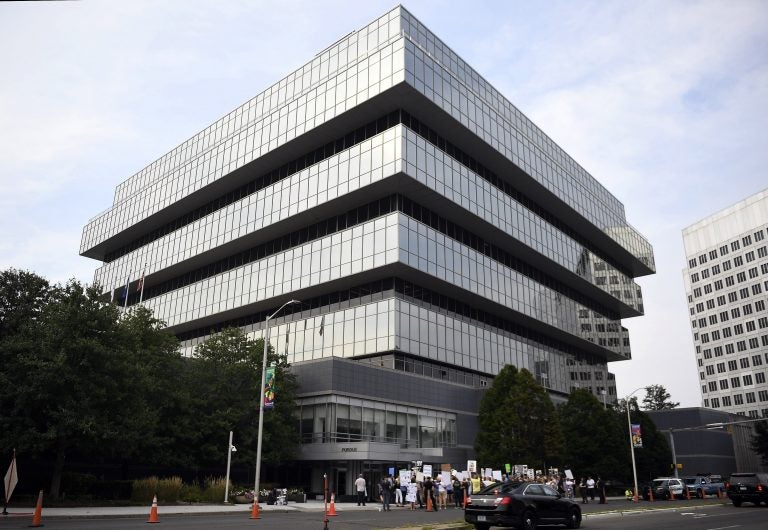Reaching a deal in national opioids case proving difficult
Sources familiar with negotiations between Purdue, multiple state attorneys general and lawyers have said the talks are essentially at a standstill.

In this August 2018 file photo, family and friends who have lost loved ones to OxyContin and opioid overdoses protest outside Purdue Pharma headquarters in Stamford, Conn. (Jessica Hill/AP Photo)
OxyContin maker Purdue Pharma made headlines earlier this year when it reached a landmark deal with Oklahoma over the toll the opioids crisis has taken on that state. Attempts to get a national settlement resolving all claims against the company are proving more difficult.
Sources familiar with negotiations between Purdue, multiple state attorneys general and lawyers representing scores of local governments have said the talks are essentially at a standstill, six weeks before the first federal trial is scheduled to begin.
Purdue has said it wants to reach a deal that would settle all claims by state and local governments. Getting there is complicated by having so many voices at the table, some attorneys general who prefer putting the company and its controlling family on trial, questions over how a “structured bankruptcy” by Purdue would work, and disagreements over payouts between state and local governments.
“It’s complex, and you just can’t snap your fingers and think everybody’s going to agree to everything,” said Joe Rice, one of the lead lawyers for local governments who also is working for some states on the case.
The parties have been trying for months to work out a nationwide settlement, something U.S. District Court Judge Dan Polster has been encouraging. He is overseeing multidistrict litigation from his courtroom in Cleveland.
Under one proposal that became public about two weeks ago, Purdue would enter a structured bankruptcy that could be worth $10 billion to $12 billion over time. Included in the total would be $3 billion from the Sackler family, which would give up its control of Purdue and contribute up to $1.5 billion more by selling another company it owns, Mundipharma.
Sources familiar with the talks but not authorized to speak publicly about them have said those remain the broad parameters for a potential settlement but are not clear on how close the sides are to reaching a deal.
They say some state attorneys general don’t want to accept that proposal, and there have been no signs that Purdue or the Sackler family are willing to offer more.
It’s also uncertain exactly who would need to approve a tentative settlement for it to become final.
Nearly 2,000 lawsuits filed by city and county governments, as well as unions, hospitals, Native American tribes and lawyers representing babies who were born in opioid withdrawal have been consolidated under Polster. Most of those lawsuits also name other opioid makers, distributors and pharmacies. Yet the lead negotiators are state attorneys general who have filed separate lawsuits in their state courts against Purdue and, in some cases, others in the drug industry.
“This is far from typical,” said Carl Tobias, a law professor at the University of Richmond in Virginia, who is following the case. “What they’re contemplating is a whole other animal that I don’t think has been used.”
The cases involved in the Cleveland litigation are not the only ones against Purdue, the maker of OxyContin, the prescription painkiller that many of the government claims point to as the drug that gave rise to the nation’s deadly opioid epidemic.
Purdue wants a settlement to resolve all claims against it, including hundreds filed in state courts. That is likely one reason it has resisted settling with Ohio’s Cuyahoga and Summit counties, whose combined trial next month is scheduled to be the first of the federal cases.
Three other opioid makers have already announced settlements of their cases with the two counties.
“Purdue Pharma believes a settlement that benefits the American public now is a far better path than years of wasteful litigation and appeals,” the Stamford, Connecticut-based company said in a statement. “We are actively working with state attorneys general and other plaintiffs on solutions that have the potential to save tens of thousands of lives and deliver billions of dollars to the communities affected by the opioid abuse crisis.”
The lawsuits against Purdue claim that OxyContin brought in billions for the Sacklers as the company persuaded prescribers that powerful opioid painkillers were appropriate in higher doses and for more patients than had previously received them. The suits also allege the company downplayed the risks of addiction.
Facing the crush of suits, the company said earlier this year that it was considering filing for bankruptcy protection. It avoided a trial in the Oklahoma lawsuit by agreeing to a settlement worth $270 million, including some money from the Sacklers.
People familiar with the negotiations but not authorized to speak about them have told The Associated Press the structured bankruptcy plan would allow the company to keep selling opioids as a public benefit trust, with the profits as part of the settlement money. The rights to overdose antidotes it has in development also would be included.
If the company does not have a settlement in place before the Oct. 21 trial date, it could file a “freefall” bankruptcy, an option that likely would mean less money for the plaintiffs. Lawsuits against the Sacklers might be able to continue but would face the challenge that much of the family’s money is believed to be outside the U.S.
The first step to reaching a nationwide settlement is getting buy-in from most state attorneys general.
Polster has said any deal should have the backing of at least 35 of them, according to a source familiar with the talks. But that number could be flexible, and the states agreeing would likely need to include those with the largest populations and those hit hardest by the opioid crisis on a per-capita basis.
Some attorneys general have been skeptical of the settlement offer.
Massachusetts Attorney General Maura Healey suggested in a statement that the terms don’t go far enough: “Our fight against Purdue and the Sacklers is about exposing the facts, making them pay for the harm they caused, and shutting them down for good,” she said. “The people who have been hurt by Purdue’s misconduct have spoken, loud and clear, about how important it is to have real accountability.”
Most attorneys general have declined to comment, but people familiar with the talks say some of the dissatisfaction from the plaintiffs is about the Sacklers not guaranteeing more money in the deal.
WHYY is your source for fact-based, in-depth journalism and information. As a nonprofit organization, we rely on financial support from readers like you. Please give today.



